New Indie Books Fight Climate Change
When you picture climate change, you might picture the rainforests disappearing. Maybe you see a lone polar bear, standing on a drifting slab of ice. Whatever the case is, what you’re picturing is probably not good. Which is why it’s important to act to keep those things from happening. Not just recycling or using less water; there are other ways too. To learn more, read any of these six books, reviewed in our May/June issue.
Just Cool It!
The Climate Crisis and What We Can Do—A Post-Paris Agreement Game Plan
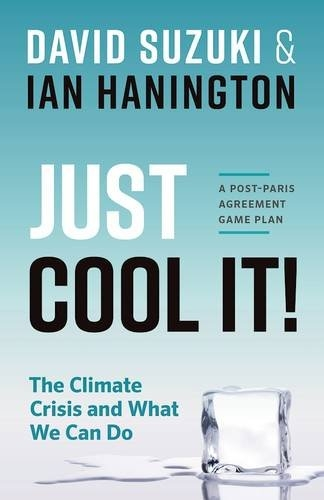
David Suzuki
Ian Hanington
Greystone Press
Unknown $18.95 (312pp)
978-1-77164-259-0
Buy: Local Bookstore (Bookshop), Amazon
As climate change gains ground in the consciousness of the public, the audience for books like *Just Cool It! *grows. The public is increasingly aware of climate change, but not necessarily clear about it, and lacking context, can’t get excited about solutions. This book provides that context in a straightforward manner that makes it ideal for entry into climate activism.
Like many books that try to deal with climate change from soup to nuts, Just Cool It! struggles with the problem of currency. Its brief reference to the 2016 US presidential race is a good example of this, though the mention doesn’t injure the book much; *Just Cool It! *is insulated enough by its own generality to be derailed much by quick changes. Still, this currency issue may impact credibility with some audiences.
Some of the information presented here, including less-publicized climate-change solutions like dark earth and agroecology, may make this book a valuable discovery resource. Just Cool It! also pulls no punches around climate-change answers that come with drawbacks, such as biodiesel. However, none of the criticism that the book offers is scathing. The tone recalls a book report in its determination to list and explain as much about climate change as possible, albeit a book report on a subject about which the writer is very passionate. However, it also plugs the David Suzuki Foundation quite regularly, a behavior that calls to mind an advertisement and does not necessarily do the book any favors.
Nevertheless, it is hard to ask for a more well-rounded introduction to climate change that is both realistic about the workability of potential solutions and optimistic about the future. Just Cool It! is a quick, easy read that covers a lot of ground. In an era when time is running out, it’s hard to argue with that.
ANNA CALL (March 27, 2017)
China Lake
A Journey into the Contradicted Heart of a Global Climate Catastrophe
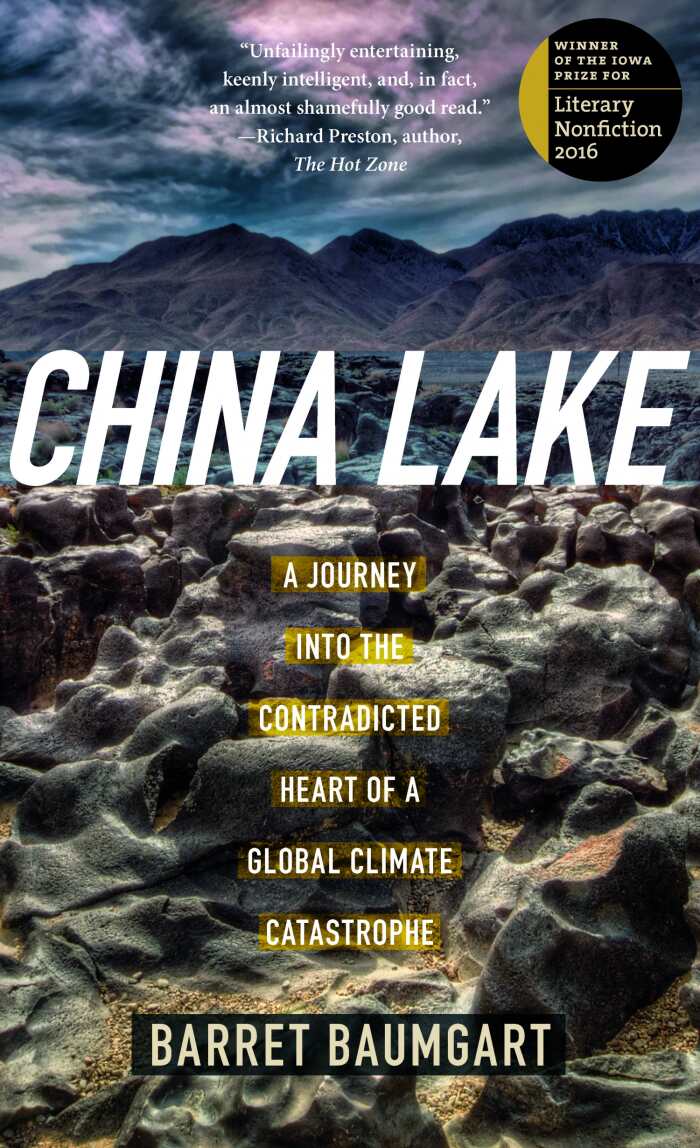
Barret Baumgart
University of Iowa Press
Softcover $19.95 (280pp)
978-1-60938-470-8
Buy: Local Bookstore (Bookshop), Amazon
Combining personal narrative and climate change research, this catastrophic book is capable of shaking the most secure temperament to its core.
The best way to look at China Lake is as a long essay. The author seeks (and obtains) interviews with climate scientists, government tour guides, citizen activists, and other inhabitants of a climate landscape where the line between existential terror and magical thinking is tense to the point of breaking. This is a place where the scientists of the twenty-first century relive ancient shamanistic desire to control the weather; where the darkness of earth worship mingles with New Age belief in mystical healing, where humans are at war with both the earth and the sky. It is, in two words, terrifying and awesome.
The author depicts himself as a slave to his own nature. His attachment to his mother and addiction to nicotine mirror the tension between the desire of the human species to survive and its reliance on oil. The book becomes more impactful by the mixing of the personal into the cosmic. The author himself becomes a sort of shaman, delving into the darkness of climate crisis and depicting what he finds there, in this modern petroglyph.
It is difficult to pin down a specific audience for the book, though many people should read it; covering military, religious, and scientific ground, it may end up being most popular among conspiracy theorists. This is a shame. Its message should be heard more widely, bleak as it is. Ultimately, the book is pessimistic, even despairing. China Lake pulls no punches, sugarcoats nothing, and never, ever talks down. Whom is this book for? The answer is unclear. The fact of its existence is a scream into the void, a statement that should be heard by the gods but which may only reach the ears of other mortals.
China Lake presents in literary form what science has thus far been unable to communicate: climate change may be survivable—maybe—but there’s no telling whether it will be worth the cost. A devastating artistic achievement.
ANNA CALL (March 27, 2017)
No One Eats Alone
Food as a Social Enterprise
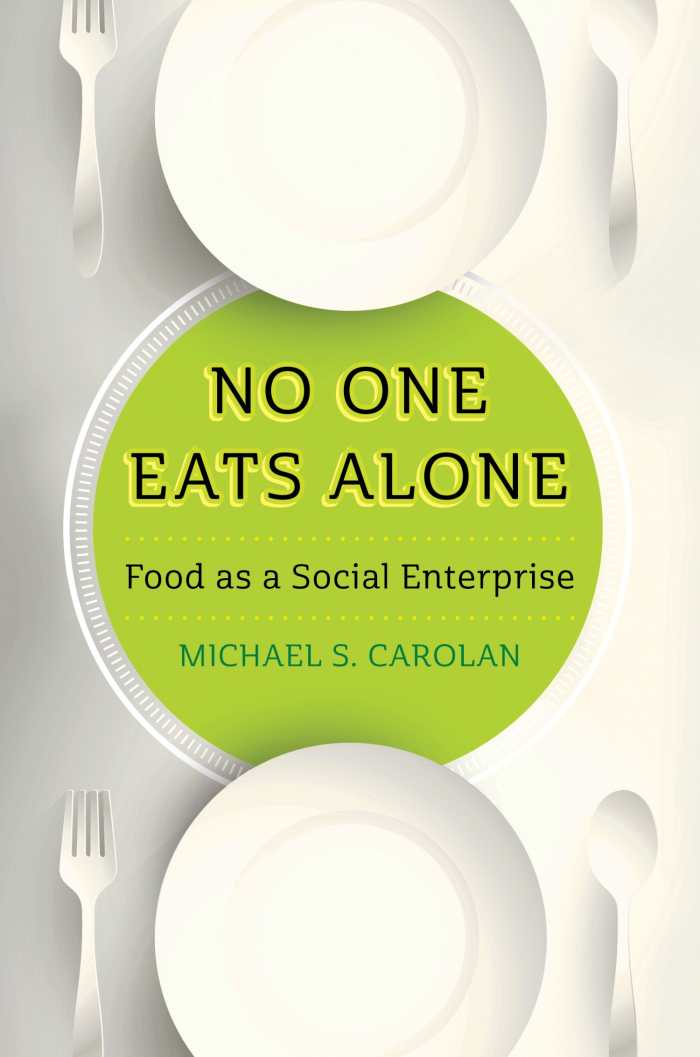
Michael S. Carolan
Island Press
Hardcover $28.00 (208pp)
978-1-61091-804-6
Buy: Local Bookstore (Bookshop), Amazon
Unlike many easy-fix food books touting local food as the answer, No One Eats Alone tackles both food and health from a systemic perspective. Its conclusions are likely to challenge eaters on all sides of the food conversation.
While it doesn’t completely negate the individual’s responsibility regarding food, Carolan’s book emphasizes that packaging, marketing, economy, and a sea change in way of life are critical factors in the reason that people make poor diet choices. Furthermore, the book highlights that choices that can seem good, such as locally sourced food, may only squeeze the balloon of energy resources into another sector of society. In one memorable example, middle-class strawberry lovers were asked to spend a day picking strawberries, ultimately coming away understanding the disproportionate energy that goes into harvest as well as the harsh economic reality of a farm worker’s life. The attention shown here to poverty, both financial and temporal, functions as an inescapable theme and touches nearly every aspect of food production and consumption. Though the book is nominally about systemic food health, it provides a valuable perspective on socioeconomics as well.
Carolan performed the majority of his interviews with Big Food insiders, including food scientists, marketers, and reformers. Some of these have repented of their efforts to promote monoculture and manipulate eaters through marketing, but others stand by their work. While No One Eats Alone is unapologetic about the author’s own perspective, it generally gives those guests a fair shake. This dramatically expands the book’s potential audience. Do not be afraid to hand it out to skeptical foodies and organic food flagbearers alike; it will likely challenge both groups.
No One Eats Alone is a singular specimen: a well-researched, thoughtful, and ultimately optimistic book on a popular subject that presents, and successfully defends, the point of view it expresses.
ANNA CALL (March 27, 2017)
Force of Nature
George Fell, Founder of the Natural Areas Movement
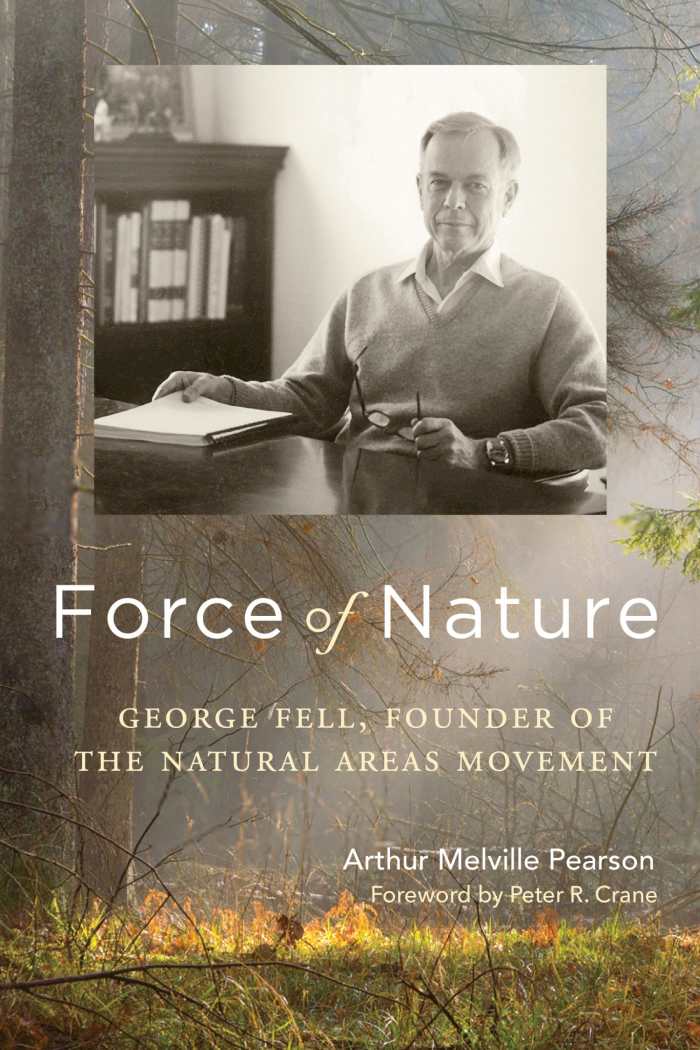
Arthur Melville Pearson
University of Wisconsin Press
Hardcover $26.95 (216pp)
978-0-299-31230-5
Buy: Local Bookstore (Bookshop), Amazon
George Fell, an unsung conservationist and founder of the Nature Conservancy, finally receives his just due in this extremely detailed biography. His life stands as a testament to tenacity as the single most important component to change.
The book follows George Fell’s life chronologically and very closely, detailing nearly every political maneuver and career shift in the course of his quest to preserve natural land. While it focuses mainly on his conservation efforts, which often take place through nonprofits, it also makes time for Fell’s personal life and history, which significantly inform his actions.
Fell’s ideas about government and its role generally trended toward smaller and less-involved government, making this biography a good choice for conservative audiences. The book does not sugar-coat his issues with authority and often recognizes the crucial role of Fell’s wife in his success. The obstinacy that he displays to a fault provides a running theme for his life, allowing him to accomplish great things, but often preventing him from working effectively with others. The many parallels between the life and work of Fell and those of Aldo Leopold give Fell’s life a context that emphasizes his relative importance to conservation.
Force of Nature deals intricately with the details of nonprofit politics and management, details that can become slightly dry at length. However, these descriptions may be valuable for environmentalists who are themselves exploring the world of nonprofit organizations. Since much of the book deals specifically with conservation in Illinois, it may be of geographical interest as well.
Highly comprehensive, this biography not only does justice to an environmental hero but also serves as a credit to the concept that successful activism requires both perseverance and practicality.
ANNA CALL (March 27, 2017)
Letter to a Young Farmer
How to Live Richly without Wealth on the New Garden Farm
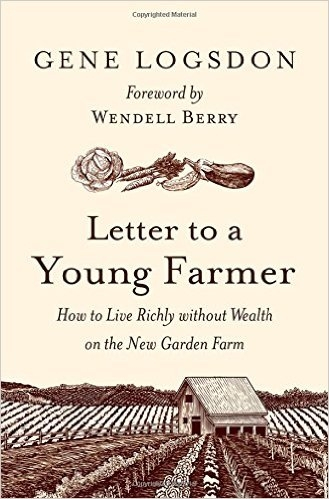
Gene Logsdon
Chelsea Green Publishing
Unknown $22.50 (224pp)
978-1-60358-725-9
Buy: Amazon
This engaging, conversational book dispenses life advice for farmers and others who seek to live close to the earth.
*Letter to a Young Farmer *is an accumulation of wisdom with a large dollop of humor and a conversational tone that will endear it to almost every audience. The book recalls a conversation with a parent or older family member in that many of its common-sense directives are informed by experience, from the purchasing of land to the management of aggressive rams. But not all the advice here is specific to farmers or “garden farmers”; general life advice can be extrapolated from discussions of love, finance, and other common-sense aspects of life.
Categorizing *Letter *is tricky at times, perhaps appropriately so, stating that “contrary farmers,” as the author self-identifies, tend to defy stereotyping. It is philosophical, but it also dispenses concrete advice. Likewise, though it does present useful information, much of this is apocryphal, cast in a slyly humorous way, and even opinionated. For example, the author agrees that climate change is a problem, but he also describes people concerned over the issue as paranoid “hand-wringers.”
*Letter *is best read as an inspirational piece. It seems likely to lure many a gardening neophyte to the farm life, though it takes care to stress the difficulty of this path too. Above all, it preaches consistency, locality, and the long view, occasionally contrasting this philosophy with the frantic pace of mainstream modern life. In the book’s worldview, small farming is the key to solving the most serious of our environmental, mental, and physical problems as well as the existential emptiness of consumerism. Yet at the same time, it does not advocate complete abandonment of capitalist modality. Parts of the book recall Buddhist principles of moderation.
With its unique point of view, *Letter to a Young Farmer *is a must-read piece of environmental, agricultural, and social philosophy.
ANNA CALL (March 27, 2017)
Saving Arcadia
A Story of Conservation and Community in the Great Lakes
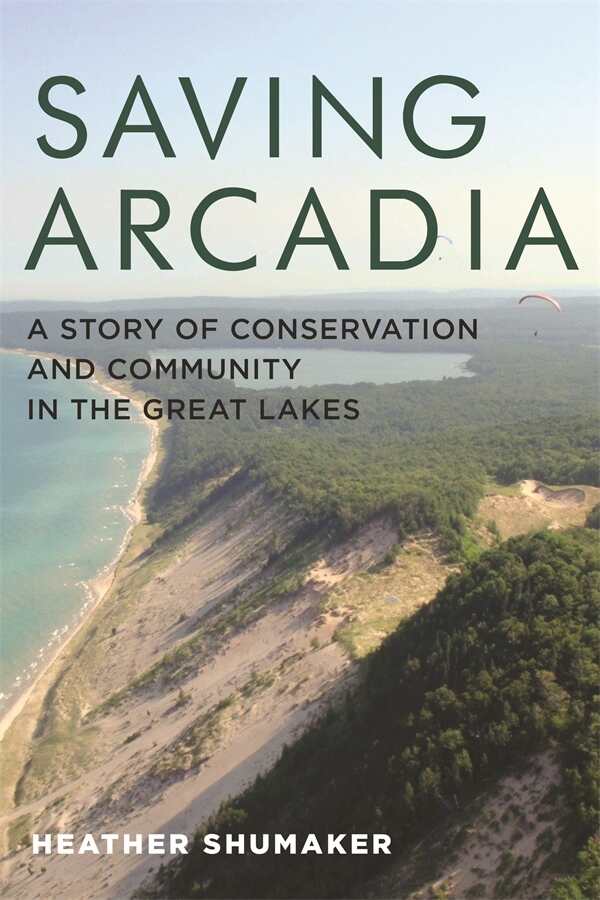
Heather Shumaker
Painted Turtle
Softcover $22.99 (168pp)
978-0-8143-4204-6
Buy: Local Bookstore (Bookshop), Amazon
This work of creative nonfiction may be among the year’s best pieces of environmental drama so far. Following the journey of a local nonprofit as it fights to save a unique dune ecosystem, it features both true-to-life recounting of real events and dramatic creative license that rivals anything in fiction.
One of the book’s most prominent features is the network of people behind the conservation effort. In many ways, Saving Arcadia pulls back the curtain on the passionate people who dedicate their careers to saving nature, only to have to force themselves into a corporate paradigm to gain donors and convince large companies to give up land. In this case, the big baddie is an energy company that nearly went down with Enron, providing a satisfying villain whose bland determination to turn a beloved community sand dune into a golf course exemplifies the banality of evil. The protagonists, on the other hand, are colorful individuals with deep community roots. The portrayal of these characters, even those who appear incidentally, is masterful. Personal details, drawn from interviews with the story’s subjects and from deep research, give the book the sense not only of a conservation record, but of a true epic surrounding a quirky, sweet community where farmers, conservationists, and the tourist industry work together to save what matters to them all.
In other hands, the story could easily have become a tedious and repetitive list of failed land purchases. Instead, it is suspenseful in places, even gripping, and full of heart throughout. One could even consider it inspiring. This is a book likely to please crowds and wow audiences. Accounts like these are what turn ordinary people into environmental activists.
Engaging, personal, and lively, this tale of the Little Nonprofit That Could is a captivating and moving triumph.
ANNA CALL (March 22, 2017)
Anna Call

